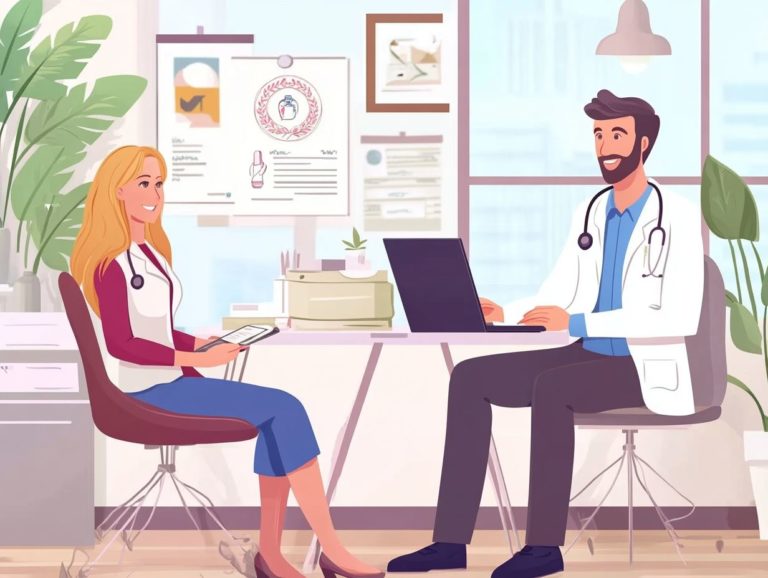7 Certifications for Mental Health Professionals
Navigating the realm of mental health professions can feel like stepping into a labyrinth, especially when it comes to grasping the myriad of available certifications.
From Licensed Professional Counselors (LPC) to Psychiatrists, each certification offers a gateway to distinct career paths and specialties tailored to your interests.
This article delves into seven essential certifications, outlining their requirements, benefits, and the ongoing education necessary to keep them current.
Whether you re a seasoned professional or just starting out, explore how these certifications can elevate your career and enrich your practice.
Contents
- Key Takeaways:
- 1. Licensed Professional Counselor (LPC)
- 2. Licensed Clinical Social Worker (LCSW)
- 3. Licensed Marriage and Family Therapist (LMFT)
- 4. Psychologist
- 5. Psychiatrist
- 6. Certified Substance Abuse Counselor (CSAC)
- 7. Certified Rehabilitation Counselor (CRC)
- What Are the Requirements for Each Certification?
- What Are the Benefits of Obtaining These Certifications?
- How Can These Certifications Help Mental Health Professionals Advance in Their Careers?
- What Are the Different Specializations Available for Mental Health Professionals?
- Continuing Education Requirements for Your Certifications
- How to Maintain Your Certifications in Mental Health
- What Are the Costs Associated with Obtaining and Maintaining These Certifications?
- Frequently Asked Questions
- Curious about the 7 certifications available for mental health professionals?
- What is the difference between a CMHP and a CMHS?
- How do I become a Licensed Professional Counselor (LPC)?
- What Does a Licensed Clinical Social Worker (LCSW) Do?
- Can a Licensed Marriage and Family Therapist (LMFT) Prescribe Medication?
- What is the Difference Between a PMHNP and a Psychiatrist?
Key Takeaways:

LPC, LCSW, LMFT, Psychologist, Psychiatrist, CSAC, and CRC are the top certifications for mental health professionals. These certifications boost your credibility and salary potential. Mental health professionals can advance their careers by obtaining these certifications and specializing in areas such as substance abuse or rehabilitation counseling.
1. Licensed Professional Counselor (LPC)
The Licensed Professional Counselor (LPC) designation serves as a pivotal certification for mental health professionals. It opens doors to a wealth of job opportunities, enhances your communication about health, and offers robust salary potential that can significantly shape your career path.
As an LPC, you are equipped to tackle various mental health issues, engage in crisis intervention, and apply evidence-based practices. You can work in many places, like private practices and hospitals.
To achieve LPC certification, you typically need a master’s degree in counseling or a related field, along with supervised clinical experience that meets a specified hour requirement. Further training workshops often delve into essential skills like ethical decision-making and cultural competency.
Employers actively seek LPCs who demonstrate strong supervision skills and effective communication abilities. These skills are crucial for fostering therapeutic relationships and guiding clients through their challenges.
Job opportunities abound in schools, hospitals, rehabilitation centers, and private practices, with salaries that reflect your experience and specialization, often ranging from $45,000 to $80,000 annually, depending on location and demand.
2. Licensed Clinical Social Worker (LCSW)
The Licensed Clinical Social Worker (LCSW) certification is essential for mental health professionals dedicated to effective therapy, managing complex behavioral health challenges, and advocating for client needs across diverse environments.
This certification shows you understand social work and care about helping people. To attain this prestigious designation, you will typically need to complete a Master of Social Work (MSW) degree, gain supervised clinical experience, and successfully navigate a test that everyone takes to prove their knowledge.
Essential skills for those pursuing LCSW status include:
- Crisis intervention techniques
- Empathy
- Strong communication abilities
It s important to grasp the breadth of practice, as LCSWs often engage in telehealth, delivering care remotely while safeguarding client confidentiality. Their holistic approach nurtures mental health by addressing the emotional, social, and environmental factors that influence an individual’s life.
3. Licensed Marriage and Family Therapist (LMFT)
The Licensed Marriage and Family Therapist (LMFT) credential enables you to specialize in relational dynamics. This equips you to provide targeted treatment options for individuals, couples, and families grappling with challenges such as anxiety disorders and major depression.
Getting this important certification requires commitment and training, typically involving the completion of a master s or doctoral degree in marriage and family therapy or a closely related field. As an aspiring LMFT, you’ll need to log several supervised clinical hours to hone your skills in assessment and intervention.
Effective communication will be your cornerstone, allowing you to navigate complex family issues and encourage open dialogue among your clients.
Ultimately, as an LMFT, you will play a crucial role in addressing mental health concerns within family systems, promoting healing and growth by understanding the intricate interplay of relationships.
4. Psychologist
Becoming a psychologist is not just a career; it’s a chance to change lives! Psychologists play an important role in the mental health arena, using their extensive education and training to assess, diagnose, and treat a wide array of mental health challenges, including neurocognitive disorders, PTSD, and emotional disturbances.
They employ methods proven to work, such as cognitive behavioral therapy, which is a popular method that helps people change negative thought patterns, to guide their interventions. Your journey to becoming a psychologist typically starts with a bachelor’s degree in psychology, laying the groundwork for the advanced knowledge and clinical skills you’ll acquire in a master’s or doctoral program.
After earning your degree, you must tackle rigorous licensing exams and often complete additional hours of supervised practice to obtain certification.
Psychologists do more than just individual therapy. They act as mental health ambassadors, advocating for healthier workplace environments. By championing mental wellness initiatives, they help organizations understand the critical importance of mental health, significantly reducing stigma and ultimately enhancing employee well-being and productivity.
5. Psychiatrist

Becoming a psychiatrist offers a rewarding opportunity to make an impact! Psychiatrists hold a crucial position in the realm of mental health, offering specialized medical insights, tailored treatment options, and expert medication management for a wide array of disorders, from major depression to complex addiction counseling. They ensure comprehensive care by collaborating seamlessly with other healthcare providers.
You begin this rewarding career by completing a bachelor s degree, followed by medical school, and then a residency in psychiatry.
Once you obtain the necessary board certifications, you may find yourself leveraging telehealth platforms, which significantly enhance accessibility and engagement for your patients.
This modern approach enables you to conduct thorough assessments and manage treatment plans effectively, providing a vital medical perspective on mental health issues.
Within integrated health units, you would work closely with psychologists, social workers, and primary care physicians, fostering a holistic treatment environment that addresses both the physiological and psychological aspects of well-being.
6. Certified Substance Abuse Counselor (CSAC)
The Certified Substance Abuse Counselor (CSAC) credential is a vital asset for mental health professionals like you who specialize in addiction counseling. This certification equips you with essential skills for conducting risk assessments and implementing effective treatment protocols tailored to individuals facing substance use disorders.
The journey to becoming a CSAC typically involves a blend of educational qualifications and hands-on training workshops that deepen your understanding of addiction and its complexities. You ll complete specific coursework covering a range of topics, from the biology of addiction to ethical considerations in counseling.
Key training workshops will focus on honing unique skills that are crucial for effective intervention, such as:
- Motivational interviewing
- Crisis management
- Culturally responsive care
It s this powerful combination of theoretical knowledge and practical experience that enables you to offer the holistic support necessary for those navigating the challenges of substance use disorders. Don’t wait! Start your journey in addiction counseling today!
7. Certified Rehabilitation Counselor (CRC)
The Certified Rehabilitation Counselor (CRC) credential represents a hallmark of expertise in guiding individuals with disabilities, ensuring they have access to essential mental health services and resources tailored to achieving their personal and professional aspirations, whether in private practice or integrated health units.
To earn this prestigious credential, you ll need a master s degree in rehabilitation counseling or a related field, complemented by practical training in various rehabilitation methods. This training will immerse you in therapeutic approaches, assessment techniques, and the complex dynamics of disability services.
Beyond the educational requirements, CRC professionals hold a crucial role in promoting holistic health. By collaborating with other healthcare providers, you ll help coordinate care that encompasses both physical and emotional well-being, enabling your clients to navigate their challenges and achieve integrated, sustainable outcomes in their lives.
What Are the Requirements for Each Certification?
The requirements for obtaining certifications in the mental health field vary significantly depending on the specific designation. Generally, you’ll need a relevant educational background, completion of training workshops, and the successful passing of board certification exams to ensure your competency and adherence to proven methods.
For instance, a master’s degree in psychology, social work, or counseling is often a primary prerequisite for advanced certifications. Many programs also require a certain number of supervised hours in clinical settings, allowing you to gain invaluable practical experience under the guidance of seasoned experts.
Continuing education is crucial. Ongoing training helps you stay informed about the latest methodologies and regulations. Obtaining accreditation from respected organizations like the National Board for Certified Counselors (NBCC) or the National Association of Social Workers (NASW) enhances your credibility and assures clients of your commitment to high standards in mental health care.
What Are the Benefits of Obtaining These Certifications?
Getting certified in mental health boosts your credibility and opens up a wealth of job opportunities. You ll see higher earning potential and specialized training that equips you with the skills employers value.
These certifications significantly enhance your competitiveness in the job market, helping you stand out in a crowded field. By honing specific skills and showing your commitment to continuous learning, you can attract a broader range of clients who seek reassurance in your expertise.
Certification can supercharge your career growth! It offers pathways into specialized areas such as trauma, addiction, or child psychology.
As you build trust and rapport with clients, you position yourself as a leading figure in your niche, paving the way for a sustainable and rewarding career.
How Can These Certifications Help Mental Health Professionals Advance in Their Careers?

Certifications are a fundamental step for you as a mental health professional. They empower you to elevate your career by highlighting your specialized training, improving your credibility, and positioning you for leadership roles in areas like training professionals and leading mental health initiatives in the workplace.
With these credentials, you ll often find pathways to supervisory roles, where you can guide teams and lead projects aimed at enhancing mental health practices.
Many professionals choose to explore specialized areas of practice, such as trauma-informed care or addiction counseling. These paths not only deepen your expertise but also expand the positive impact you have on clients’ lives.
There are also numerous opportunities for ongoing professional development, including workshops, seminars, and courses focused on advocacy and mental health education. This continuous learning keeps you updated on best practices and helps you advocate for mental health in your community.
What Are the Different Specializations Available for Mental Health Professionals?
As a mental health professional, you have access to a wide array of specializations, allowing you to tailor your practice to meet specific client needs.
Whether it s addiction counseling, crisis intervention, or the integration of mindfulness practices, each area offers unique avenues for growth and impact. Pursuing additional certifications in these fields can enhance your expertise and better serve diverse populations.
If you re focusing on addiction counseling, a solid understanding of substance use disorders and recovery processes is essential. Those looking into crisis intervention need to master rapid assessment and de-escalation techniques.
For mindfulness integration, understanding meditation practices and their effects on mental health is crucial. Each specialization can significantly influence client outcomes; tailored approaches often lead to higher recovery rates, improved coping mechanisms, and overall enhancements in mental well-being.
Your commitment to ongoing education and specialization enriches your practice and fosters stronger, more effective therapeutic relationships with your clients.
Continuing Education Requirements for Your Certifications
Continuing education is essential for maintaining your certifications in mental health. It ensures you stay updated on the latest evidence-based practices, treatment options, and emerging trends in the field.
You can pursue these through various avenues, including online education and training workshops. By engaging in these learning opportunities, you not only meet your certification requirements but also enhance your skills and knowledge. This leads to more effective client care.
Each certification comes with specific continuing education requirements that encourage exploration of specialized areas, such as trauma-informed care or cognitive behavioral therapy, which is a type of therapy that helps people change negative thoughts and behaviors.
This ongoing education fosters your professional growth and equips you with innovative tools and techniques to support your clients better. Ultimately, your clients benefit from your informed practice, as you gain a deeper understanding of their unique needs, resulting in more tailored and effective treatment strategies.
How to Maintain Your Certifications in Mental Health
Maintaining certifications in the mental health field means you need to engage in continuous learning and training. This adherence to the standards set by accrediting bodies ensures your practices align with current knowledge and ethical guidelines.
You can use different strategies to achieve this, such as actively participating in networking opportunities that connect you with peers and industry leaders. Building these relationships enhances your knowledge base and opens doors for collaborative learning.
Attending workshops is another excellent way to acquire practical skills and insights relevant to modern practices. Staying informed about policy updates is crucial. Consider subscribing to reputable journals or joining professional associations that provide resources on the latest legislative changes in mental health care.
By integrating these strategies, you can elevate your expertise and ensure you remain aligned with the ever-evolving practices in the field.
What Are the Costs Associated with Obtaining and Maintaining These Certifications?
Understanding the costs associated with obtaining and maintaining mental health certifications is vital for aspiring clinicians like yourself. These expenses can encompass educational fees, training workshops, exam costs, and ongoing professional development through online education.
Beyond the initial outlay, it s wise to consider indirect costs as well. This includes travel costs for workshops, necessary materials and books for your coursework, and any potential lost income if you decide to study full-time. Effective budgeting is key.
Don’t let financial surprises hold you back plan your budget wisely! By creating a detailed plan that aligns these expenses with your anticipated income, you can help alleviate financial stress. If you re already in the field, don t forget to factor in renewal fees and subscription costs for essential resources to keep your knowledge current.
Focusing on the long-term benefits of certification such as increased earning potential and enhanced career opportunities can serve as a powerful motivator. Rather than viewing these costs merely as expenses, consider them valuable investments in your future. Invest in your future today!
Frequently Asked Questions

Curious about the 7 certifications available for mental health professionals?
The 7 certifications for mental health professionals are Certified Mental Health Professional (CMHP), Certified Mental Health Specialist (CMHS), Licensed Professional Counselor (LPC), Licensed Clinical Social Worker (LCSW), Licensed Marriage and Family Therapist (LMFT), Psychiatric Mental Health Nurse Practitioner (PMHNP), and Certified Addiction Counselor (CAC).
What is the difference between a CMHP and a CMHS?
The main difference between a Certified Mental Health Professional (CMHP) and a Certified Mental Health Specialist (CMHS) is the level of education and training. CMHP requires a bachelor’s degree in a related field, while CMHS requires a master’s degree in mental health counseling.
How do I become a Licensed Professional Counselor (LPC)?
To become a Licensed Professional Counselor (LPC), you must have a master’s degree in counseling or a related field, complete a certain number of supervised clinical hours, and pass a licensing exam. Requirements may vary by state.
What Does a Licensed Clinical Social Worker (LCSW) Do?
LCSWs are mental health professionals with a master s degree in social work. They provide therapy and help clients with coordination of care and advocacy.
Can a Licensed Marriage and Family Therapist (LMFT) Prescribe Medication?
LMFTs cannot prescribe medication. Their expertise lies in therapy for individuals, couples, and families facing mental health challenges.
What is the Difference Between a PMHNP and a Psychiatrist?
A Psychiatric Mental Health Nurse Practitioner (PMHNP) is a nurse with advanced mental health training. Unlike psychiatrists, they can prescribe medication and provide therapy.






